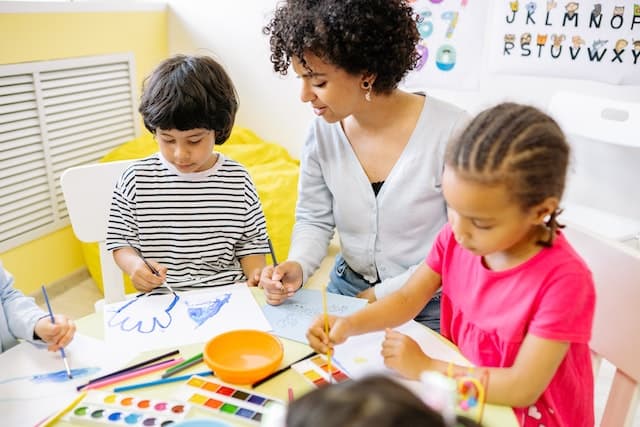Art is smart in early childhood development.
Every child is innately creative and there are so many ways that they benefit from art exploration during their early education. Whether they’re sorting pencils into colours, getting messy with clay or swooshing paint onto paper, the skills and lessons they learn from participating in arts and crafts are invaluable as they progress through their early years and onwards throughout life.
A child’s natural curiosity is what drives them to explore their surroundings and make sense of the world and their place in it. During art play in an early learning environment, children experiment, examine, discover and decipher using a variety of materials and the possibilities for learning and development are infinite.
What young children learn through art exploration
Art time in a childcare or early learning centre allows little people to freely express their creativity, communicate their ideas, try new things and experiment with materials.
Self-expression without judgement or expectation is crucial for a child’s healthy development, and when combined with the many cognitive, social, emotional and physical benefits of art exploration, it’s evident why this is such a vital activity in early education.
Important skills children learn during art
Physical skills. Gripping pencils or a paintbrush, moulding clay, glueing bits onto a collage, bending pipe cleaners, cutting or tearing paper – these are all excellent ways to help young children learn to control small movements and develop their fine motor skills.
Maths and numeracy skills. Counting pencils. Painting patterns and shapes. Cutting out different things. During art play, children can be exposed to a variety of maths and numeracy concepts and they can start practising their skills in these areas.
Language and communication skills. When an educator encourages conversation with the child about their art and provokes discussion about the process, different textures, materials etc, it’s an opportunity for the child to practise their language and communication skills and learn new vocabulary. A child can also share their work with other children and parents, creating opportunities to develop their language skills.
Cognitive development. Through art, children learn to express their ideas and their imagination. For example, when they use the same material in different ways (eg thick paint vs paint that is diluted with water, pressing hard with a crayon vs a light touch, creating with freshly picked leaves vs dried ones), they learn about things such as cause and effect, critical thinking, decision-making and problem-solving.
Social and emotional skills. Children feel a sense of achievement when they create something and it can lead them to feel good about themselves and develop a positive self-esteem. They learn that they have control over their effort.They can also learn about respecting and appreciating that everyone’s self-expression is unique and valuable. Exploration through art can also help them to experiment with new materials and ideas and to translate these experiences into other areas of life.

Art in early years education
There are clearly many reasons why art should be a regular feature in any early education curriculum. It shouldn’t be restricted to being a ‘special occasion’ activity, but should rather be integral to the daily routine so that children benefit from the myriad educational and developmental opportunities that it presents.
Educators and adults alike can facilitate learning through art exploration by doing the following:
- Providing a variety of materials and resources to encourage sensory play, innovation and creativity
- Supporting and encouraging child-directed expression
- Giving the child the freedom to discover and experiment
- Focusing on the process, rather than the outcome
- Embracing wherever a child is on their creative journey without judgement or expectation
- Asking open-ended questions to encourage conversation
Free expression is vital for a child’s healthy growth and development which is why artistic activities are so valuable in early education. A child need not produce a masterpiece to have a meaningful artistic experience – and the skills and benefits accrued throughout the creative process are what’s important, not the end product.